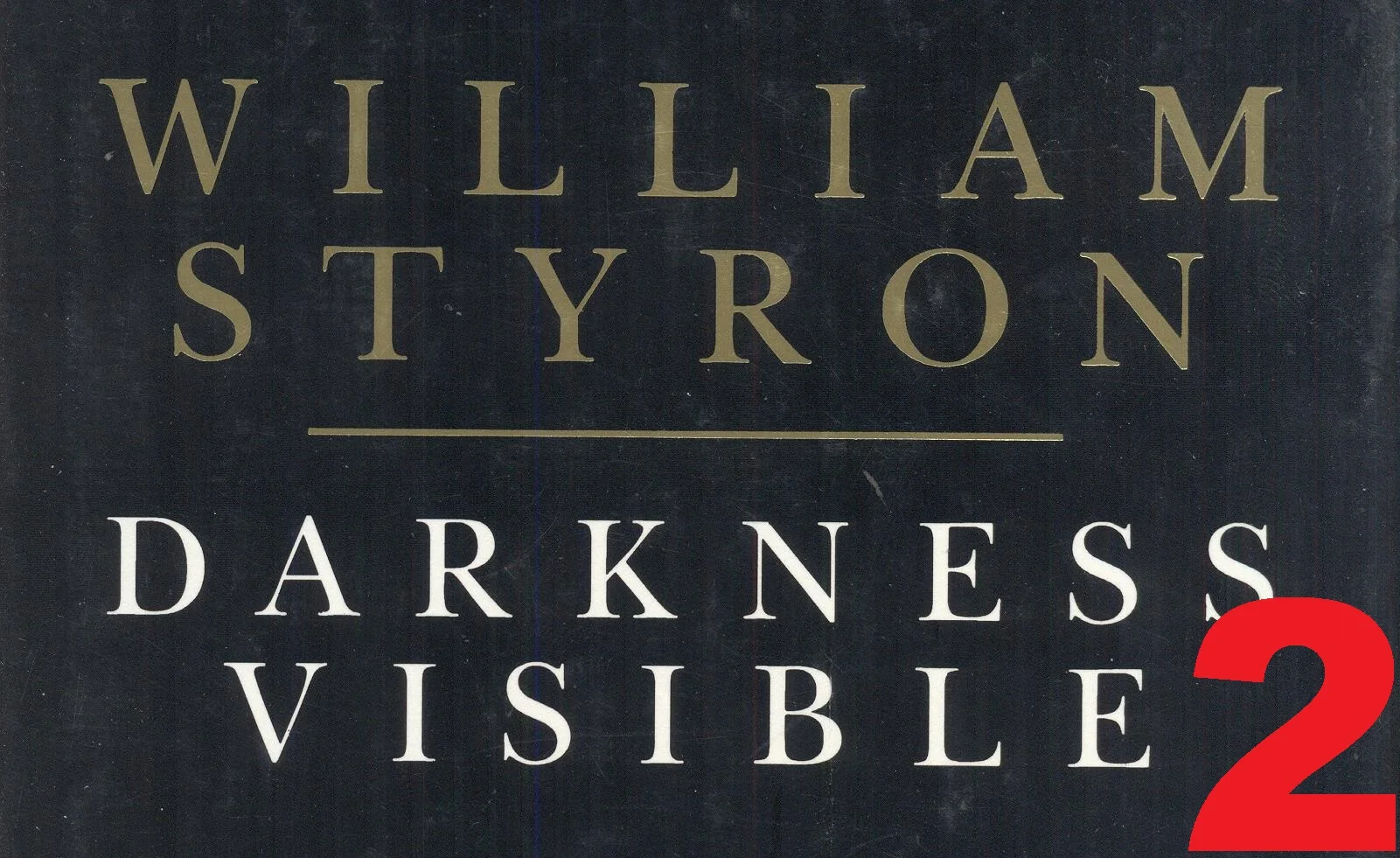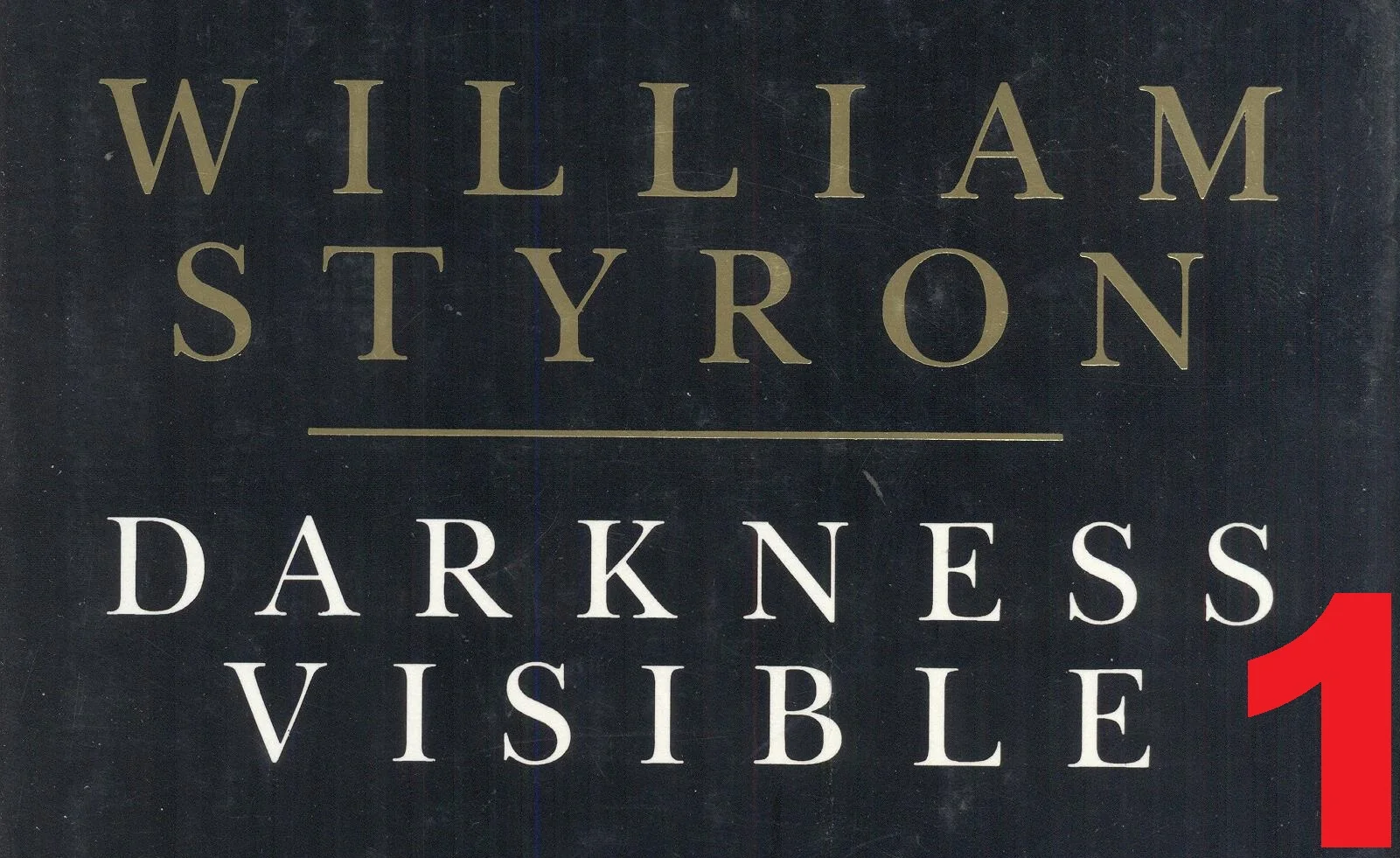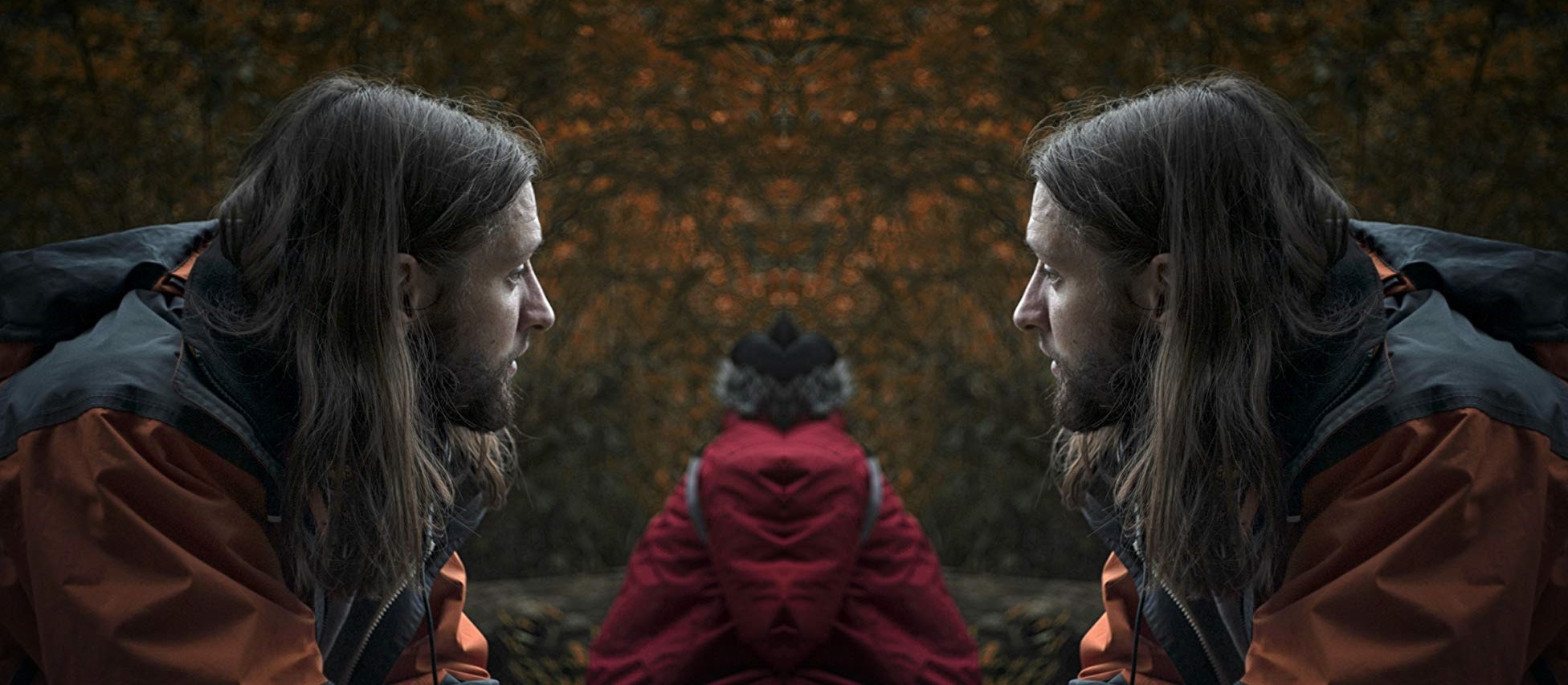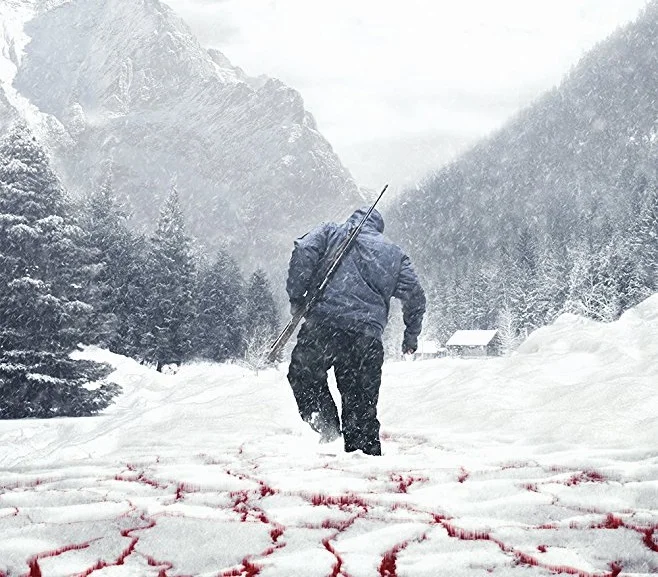Fresh off the insights into clinical depression provided by William Tryon's "Darkness Visible: A Memoir of Madness," the duo discuss Lars Van Trier's 2011 film "Melancholia." They discuss how the lead character Justine, played by Kirsten Dunst, manifests the myriad symptoms of depression while several characters - from her doting sister to her impatient brother-in-law - display the different coping mechanisms of dealing with someone who depressed, with Justine's beau, played by Alexander Skarsgard, stuck with the saddest role: completely ignorant dunce. There's a pun there, I'm sure of it!
Episode 113 - Depression Month 2: Darkness Visible, Part 2
The duo finish discussing William Styron's "Darkness Visible: A Memoir of Madness." as William's depression gets even more severe and he discovers that therapy is useless and geese are terrifying. He discusses some of the stranger aspects of depression: the palpable quality of ominousness, his irrational possessiveness, depression's relationship to the concept of loss, and the mind's capacity to endure what seems to be interminable. And then of course like all severe depressives he just almost instantly gets better; whew, had us worried there Mr. Styron!
Episode 112 - Depression Month 1: Darkness Visible, Part 1
The duo kick off Depression Month with the first half of William Styron's "Darkness Visible: A Memoir of Madness." They discuss William Styron's realization that he had a serious problem, his disastrous attempts at making small talk at a prestigious soiree during the throes of his depression, the elusive nature of depression's pain and the difficulties in describing it to someone who has never suffered from it, and why the word "depression" is a poor substitute for BRAINSTORM!
Episode 111 - Jonathan Raab, Colorado's Favorite Son
We speak with Jonathan Raab, editor of Muzzleland Press and author of the forthcoming Camp Ghoul Mountain Part VI: The Official Novelization about small press publishing, the lure of horror and the supernatural, mental health, religiosity, the quest for satisfaction, and the fundamental question of why bother doing anything. J.R. expresses his love. J.R. is rebuffed.
Episode 110 - Nick Szostakiwskyj, Calgary's Favorite Son
The duo become investigative journalists once again and surprise themselves by the amount of information they get from director, writer, and all-around polymath Nick Szostakiwskyj, who directed the Lovecraftian horror film Black Mountain Side (2014) and the forthcoming Hammer of the Gods (2019). Nick talks origins, inspirations, financing, advertising and distribution blunders, independent film realities, the Book of Job, and more, all while Canadian huskies howl in the background. The DEFINITIVE Nick Szostakiwskyj interview.
Episode 109 - Q1 FY19 Horror Roundup 2
J.R. attends the Scary Movies 11 Festival at Lincoln Center and Derek has too much free time as the duo discuss a ton of new horror films and fiction. In a spoiler-free discussion, J.R. highly recommends The Witch in the Window , and then largely recommends Await Further Instructions , Anna and the Apocalypse and the more-polarizing film Hurt, while Derek recommends Brimstone, which seemed to fall under the radar. J.R. was fitfully amused by Blood Paradise and is more mixed about What Keeps You Alive and the entertaining but glib Lords of Chaos. J.R. can’t recommend Boogeyman Pop, and stay far, far away from The Inhabitant. Derek, as expected, dismisses Hellraiser: Judgment but perhaps not as harshly as you would expect, unlike The Meg, The First Purge, and Mom and Dad, which are easily dismissed. They also briefly cover Castle Rock, House of Leaves and Stephen King’s The Outsider, and give a collective “meh” to Veronica. Lastly, the weird fiction collection The Weird lives up to its namesake and is recommend if you have 3 months.
Episode 108 - Underseen Lovecraftian Horror 3: Stalker
The duo throw out a curve ball and discuss Andrei Tarkovsky's 1979 masterwork "Stalker," based on the episodic novel "Roadside Picnic." We discuss some of the important differences between the more action-heavy novel and the more measured film, some of the works' Lovecraftian themes and philosophical implications, and imagine a skeezy A24-style trailer promising Stalker-sized action and thrills!
Episode 107 - Underseen Lovecraftian Horror 2: The Spider Labyrinth
The duo discusses “The Spider Labyrinth,” the 1988 Italian horror film that you should check out if you have 82 minutes and your fondness for Lovecraftian-themes like forbidden cults and secret Gods renders you particularly tolerant and forgiving to a movie that has deep, deep flaws. Horror fans, frankly, have lower standards for films that fall within their wheelhouse, so your mileage may vary. This movie has some effective scenes, a pretty “out there” ending, and “good bones,” in that the pieces are in place for the movie to be good, but good Lord are these some creaky clichés and absurdly dense characters.
Episode 106 - Underseen Lovecraftian Horror 1: Black Mountain Side
The duo discusses Black Mountain Side, a film you should see. J.R. was skeptical given its surprisingly low IMDB score and a corny poster pull quote that exclaims proudly that the movie is “expertly made,” like as if you should expect a real movie or something! But Derek was right, this movie is generally effective and worth seeing, even if its mythology is a bit all over the place. Also, the writer-director was only 21 years old when he made this, as if you need any more reason to feel bad about how little you’ve personally accomplished
Episode 105 - Benson/Moorhead 3: The Endless
The duo kicks off “obscureish Lovecraftian film month” by discussing The Endless, the recent film by Justin Benson and Aaron Moorehead, about two brothers who escaped from a cult who voluntarily return and find themselves entangled in mysterious machinations. We debate whether this movie has any reason to exist, given that it serves essentially as a sequel to Resolution that fails to cover any new ground and explains-away much of what gave Resolution its power.
Episode 104 - H.P. Lovecraft: Against the World, Against Life, Part 3
We end our discussion of Michel Houellebecq's "H.P. Lovecraft: Against the World, Against Life" by covering our favorite part of the book, a mini-biography of H.P Lovecraft that could make even the most ardent Lovecraft-hater out there at least somewhat sympathetic to the man (or at least pity him), and provides some extreme cringe at Lovecraft's disastrous attempts to get an office job. This mini biography attempts to connect Lovecraft's rapid descent into poverty while in New York, and the hatred and fear it engendered within him, with the power and prose of his later, more mature works.
Episode 103 - H.P. Lovecraft: Against the World, Against Life, Part 2
We discussed "H.P. Lovecraft: Against the World, Against Life" for so long that we had to divide the conversation into three episodes. So enjoy this middle chapter, where Houellebecq discusses . . . architecture (?), why everything is disgusting and Lovecraft's use of sensory overload, Lovecraft's protagonists, and Houellebecq's cognitive dissonance, where he praises Lovecraft's scientific realism while maintaining Lovecraft . . .avoided realism? How does that work? Come join us!
Episode 102 - H.P. Lovecraft: Against the World, Against Life, Part 1
The duo covers the first half of Michel Houellebecq’s sympathetic yet critical essay on H.P. Lovecraft, which has the not-at-all hyperbolic-yet-awesome title of ‘H.P. Lovecraft: Against the World, Against Life.“ We learn a little a bit about Lovecraft’s "technical assault” against the reader, his hatred of “life and "the real,” and his nostalgia for a bygone childhood. Stephen King’s uses his introduction to question some of the premises of the essay but introduces his own goofy theories about Lovecraft. Come join us and discuss!
Episode 101 - Q1 FY19 Horror Roundup
Derek is in New York as the duo ramble about some horror movies and works. Please note that no preparation at all went into this episode, so don’t just us TOO harshly. We go over Halloween and Halloween II (which Derek had never even seen before, that slacker); Hereditary, which is the SCARIEST MOVIE OF ALL TIME OHMYGOD (until A24 needs to get more asses in seats for the next SCARIEST FILM EVER); the interesting play YERMA, about a woman obsessed with having a child; the new season of Channel Zero, the Roger-Ebert-approved Exorcism of Emily Rose, and well-reviewed duds like CARGO and LITTLE EVIL, which again demonstrates that critics cannot be trusted (except us, of course, we never steer ya wrong).
Episode 99 - Trick or Treat, Part 2
It’s Halloween in the Summer. The duo finish their discussion of Lisa Morton’s “Trick of Treat: A History of Halloween,“ by discussing the Halloween traditions of other countries and the influential poetry and literature of Halloween. In the Ukraine, pumpkins are seen as a bad omen. And, this might be a shocker, but that guy Hugo Chavez, not a big fan of the American tradition: I mean, it’s tough to TP houses when there’s no more TP in the whole country, right?
Episode 98 - Trick or Treat, Part 1
It's Halloween in the Summer. The duo discusses the first half of "Lisa Morton's Trick of Treat: A History of Halloween," which reads a bit more like a collection of Wikipedia articles than a book. The duo covers Samhain, faulty histories and the Celts, violent Halloween games, urban legends, and the origins of several Irish stereotypes.
Episode 97 - Giant Killer Animals 4: Razorback (1984)
Join the duo as they discuss Razorback, the piece de resistance of Giant Killer Animal Month, which Google succinctly summarizes as “a big Australian pig attacks an old man, grabs a baby and kills a newswoman; her husband investigates.” Not wrong, but that description leaves out the wonderfully bizarre, Dali-esque landscapes, the ‘Wake in Fright / Mad Max’ levels of Ozsploitation, the 'Straw Dogs’ vibe of rural townies v. educated out-of-towners, and the glowing lights….all those glowing lights!
Episode 96 - Giant Killer Animals 3: Alligator (1980)
The duo discuss the 1980 film "Alligator" about - you guessed it - a giant alligator. Particularly, they discuss why this film generally works, from John Sayles' better-than-it-needs-to-be script, to Lewis Teague's competent if workmanlike direction, to the man himself Robert Forster's lovable Chicago cop David Madison, which was the inspiration for the character Robert Forster played in Quentin Tarantino's "Jackie Brown." (Seriously) But let's not overstate things, here: this is still a shlocky b-movie, albeit a fun one. Come have a listen!
Episode 95 - Giant Killer Animals 2: Orca (1977)
The duo watch "Orca," the 1977 film that tried to beat Jaws at its own aquatic-killer game. Not only is the killer whale more dangerous and fearsome than the great white shark, it can read blue prints, understands how flammables work, never forgets a face, has an unquenchable thirst for revenge, and can rub in a victory by flopping out of the water and wagging its tail at you. Too bad orca whales look so wholesome and cute, kind of undermines the whole fear factor. Join us as we discuss ancient native mysticism and the words professors could say in the 1970s that they definitely couldn't say today!
Episode 94 - Giant Killer Animals 1: Grizzly (1976)
The duo kick of Giant Animals Attack month with the 1976 horror film “Grizzly,” which is essentially a beat-for-beat remake of “Jaws,” with a cuddly big bear instead of a shark. If “Jaws” proved to everyone that an elevated b-movie could earn respect and acclaim, “Grizzly” showed everyone that an inferior knockoff can at least make a lot of money. The duo also discuss the frenzied career of director and all-around indie film hustler William Girdler, who banged out 9 ripoff films (including Grizzly) in only six years before ripping off Lynyrd Skynyrd and dying in a plane crash.



















